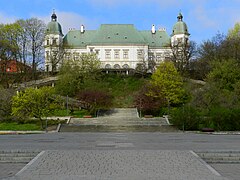Jazdów
| Ujazdów Castle Zamek Ujazdowski (Polish) |
|
|---|---|

Ujazdów Castle, seen from the Royal Canal
|
|
| General information | |
| Architectural style | Baroque-Neoclassical |
| Town or city | Warsaw |
| Country | Poland |
| Coordinates | 52°13′10.16″N 21°01′51.92″E / 52.2194889°N 21.0310889°ECoordinates: 52°13′10.16″N 21°01′51.92″E / 52.2194889°N 21.0310889°E |
| Completed | 1624, 1974 |
| Demolished | 1944 |
| Client | Sigismund III Vasa |
Ujazdów Castle (Polish: Zamek Ujazdowski) is a castle in the historic Ujazdów district, between Ujazdów Park (Park Ujazdowski) and the Royal Baths Park (Łazienki Królewskie), in Warsaw, Poland.
Its beginnings date to the 13th century, and it was rebuilt several times. Like many structures in Warsaw, it sustained much damage in the Warsaw Uprising (1944). Reconstructed 30 years later (1974), it now houses Warsaw's Center for Contemporary Art.
The first castle on the spot was erected by the Dukes of Masovia as early as the 13th century. However, in the following century their court was moved to the future Royal Castle in Warsaw, and the Ujazdów Castle fell into neglect. In the 16th century, a wooden manor was built there for Queen Bona Sforza. It was at Ujazdów Castle, on January 12, 1578, that Jan Kochanowski's blank-verse tragedy The Dismissal of the Greek Envoys received its premiere during the wedding of Jan Zamoyski and Krystyna Radziwiłł.
The ruins of the castle of the Mazovian princes were then incorporated into a new fortified manor built by King Sigismund III Vasa for his son, future King Władysław IV Vasa. However, there is little evidence that the residence was ever used by the young prince, who spent much of his youth either at his father's court. Between 1659 and 1665, the building housed the mint of Titus Livius Boratini, who there struck his famous boratynka, a type of copper coin.
...
Wikipedia
